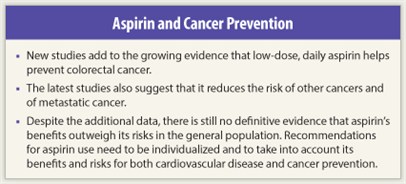Three new studies have added data to the growing evidence that low-dose, daily aspirin helps prevent colorectal cancer and other malignancies and may be useful in preventing metastases as well.1-3 Coming on the heels of other recent studies, the results appear to strengthen the case for using aspirin to prevent colorectal cancer in the general population, as it is now used by many to prevent coronary heart disease.
 But conflicting evidence from two large randomized trials (which looked at alternate-day aspirin, not daily aspirin), plus concern about aspirin’s side effects, may keep population recommendations on hold for a while longer. In a commentary accompanying the new studies,4 Andrew T. Chan, MD, of Massachusetts General Hospital and Harvard Medical School said that the additional data, though significant, still fall short of the level needed to change formal guidelines (see sidebar).
But conflicting evidence from two large randomized trials (which looked at alternate-day aspirin, not daily aspirin), plus concern about aspirin’s side effects, may keep population recommendations on hold for a while longer. In a commentary accompanying the new studies,4 Andrew T. Chan, MD, of Massachusetts General Hospital and Harvard Medical School said that the additional data, though significant, still fall short of the level needed to change formal guidelines (see sidebar).
The evidence is “gradually tipping toward the point of view where aspirin seems to make sense for many in the general population,” Dr. Chan said in an interview. “But the state of the data is still not definitive.”
Three Studies
In the three new studies, which appeared online in The Lancet and Lancet Oncology on March 21, Peter M. Rothwell, MD, PhD, at Oxford University and colleagues reviewed and analyzed data from trials and observational studies of daily aspirin to prevent coronary heart disease. In one of The Lancet studies,1 they looked at the short-term effects of daily aspirin in 51 randomized trials of aspirin (any dose and duration) vs no aspirin, finding that aspirin significantly reduced mortality from any cancer. Its effects were especially strong after 5 years. Aspirin increased the risk of major bleeding—its major side effect—but only for the first 3 years of follow-up.
In a companion study in The Lancet,2 Dr. Rothwell and colleagues looked at the risk of metastases in five large randomized trials among participants who had newly diagnosed cancers during the trial follow-up period. They found that aspirin significantly reduced the risk.
 And in a third study, published in Lancet Oncology,3 Dr. Rothwell and coauthor Annemijn Algra, BSc, looked at the effects of aspirin on long-term incidence and metastases in observational studies and compared the results to those of randomized trials. In observational studies, regular aspirin use was associated with a lower incidence of colorectal cancer and mortality related to the disease. Regular aspirin use also was associated with fewer cancers that have produced distant metastases. The results correlated well with those of randomized trials and, like the results in the two Lancet studies, were statistically significant.
And in a third study, published in Lancet Oncology,3 Dr. Rothwell and coauthor Annemijn Algra, BSc, looked at the effects of aspirin on long-term incidence and metastases in observational studies and compared the results to those of randomized trials. In observational studies, regular aspirin use was associated with a lower incidence of colorectal cancer and mortality related to the disease. Regular aspirin use also was associated with fewer cancers that have produced distant metastases. The results correlated well with those of randomized trials and, like the results in the two Lancet studies, were statistically significant.
These are novel contributions, Dr. Chan said. “They suggest that aspirin may have an effect in the later stages of carcinogenesis as well as the earliest stages of tumor initiation.”
In earlier studies, also published in The Lancet, Dr. Rothwell and colleagues have shown that daily aspirin taken to prevent cardiovascular disease reduced deaths from colorectal cancer after 7 to 8 years’ follow-up and deaths from several other cancers including gastrointestinal, lung, and brain cancers, after 5 years.
Guidelines under Review
 In the wake of these reports, some groups are reviewing their current guidelines, which recommend aspirin to prevent coronary heart disease but not colorectal cancer. “We’re all aware of this issue,” said Virginia Moyer, MD, MPH, who chairs the United States Preventive Services Task Force. The Task Force, which reviews all its guidelines on a rotating schedule, will be looking at this one, though no date has been set. “It remains on the active topic list,” Dr. Moyer wrote in an e-mail, “and will be updated, but unfortunately, it’s waiting in line with a number of other important updates.”
In the wake of these reports, some groups are reviewing their current guidelines, which recommend aspirin to prevent coronary heart disease but not colorectal cancer. “We’re all aware of this issue,” said Virginia Moyer, MD, MPH, who chairs the United States Preventive Services Task Force. The Task Force, which reviews all its guidelines on a rotating schedule, will be looking at this one, though no date has been set. “It remains on the active topic list,” Dr. Moyer wrote in an e-mail, “and will be updated, but unfortunately, it’s waiting in line with a number of other important updates.”
In the meantime, analysis continues in two large studies that did not show any benefit for aspirin in colorectal cancer after 10 to 12 years’ follow-up. Both the Women’s Health Study and the Physicians’ Health Study looked at aspirin taken every other day rather than daily. New data from these large and rigorous studies, when available, are expected to have a substantial influence on the evolution of future guidelines. ■
Disclosure: Dr. Rothwell has received honoraria for talks, advisory boards, and clinical trial committees from AstraZeneca, Bayer, Boehringer Ingelheim, Sanofi-Aventis/ Bristol-Myers Squibb and Servier, and is on the executive committee of the ARRIVE Trial. Dr. Chan has served as a consultant to Bayer HealthCare and Millennium Pharmaceuticals. Dr. Moyer reported no potential conflicts of interest.
Expert Point of View: Andrew T. Chan, MD
References
1. Rothwell PM, Price JF, Fowkes FGR, et al: Short-term effects of daily aspirin on cancer incidence, mortality, and non-vascular death: Analysis of the time course of risks and benefits in 51 randomised controlled trials. Lancet. March 21, 2012 (early release online).
2. Rothwell PM, Wilson M, Price JF, et al: Effect of daily aspirin on risk of cancer metastasis: A study of incident cancers during randomised controlled trials. Lancet. March 21, 2012 (early release online).
3. Algra AM, Rothwell PM: Effects of regular aspirin on long-term cancer incidence and metastasis: a systematic comparison of evidence from observational studies versus randomised trials. Lancet Oncol. March 21, 2012 (early release online).
4. Chan AT, Cook NR: Are we ready to recommend aspirin for cancer prevention? Lancet. March 21, 2012 (early release online).

 Is it time to recommend aspirin for cancer prevention? “It’s the question we are asking,” said Andrew T. Chan, MD, Massachusetts General Hospital and Harvard Medical School, who wrote a commentary accompanying three new studies in The Lancet and Lancet Oncology. The studies, by Peter M. Rothwell,...
Is it time to recommend aspirin for cancer prevention? “It’s the question we are asking,” said Andrew T. Chan, MD, Massachusetts General Hospital and Harvard Medical School, who wrote a commentary accompanying three new studies in The Lancet and Lancet Oncology. The studies, by Peter M. Rothwell,...